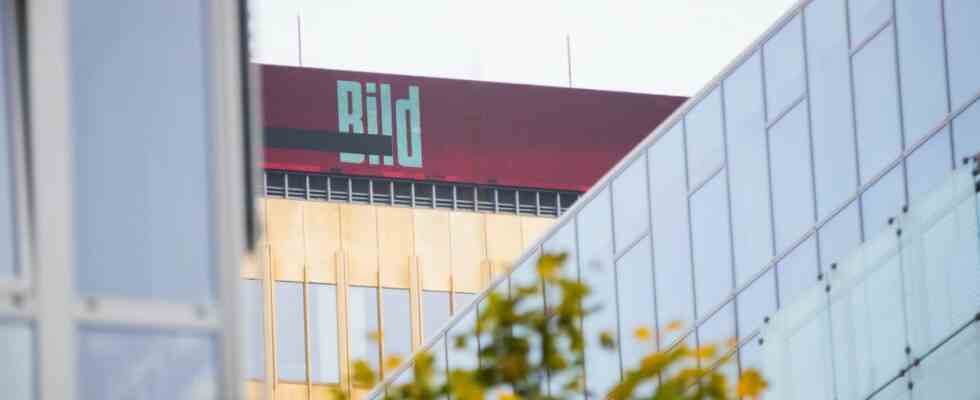In terms of press ethics, everything was permissible: three months after the publication of the image-Article “Die Lockdown-macher” the German Press Council came to this decision. The article was sharply criticized not only by a broad readership, but also by German scientific institutions. By mid-December, the German Press Council had received 94 complaints about the December 4 article. It was always about the question of whether the editors had fulfilled their duty of care and the requirement of truthfulness.
The “Bild” newspaper had already reacted in December and slightly softened the headline: Originally, she also wrote about the “lockdown makers”: “Expert trio gives us frustration at the festival”.
(Photo: Screenshot bild.de)
One of the best-known complainants to the press council was the Humboldt University in Berlin, whose physicist Dirk Brockmann was named in the article. The university turned itself in with a statement closed behind him. Readers are suggested that scientists are responsible for political decisions. “This type of reporting is far from any form of journalistic honesty,” the university wrote. Researchers would be “tagged”.
A broad alliance of scientific organizations also published an appeal for more objectivity in Corona reporting.
In 2021, 26 out of 60 complaints were made by the “Bild” media
The complaints committee of the press council now states: “The description of the three experts as ‘lockdown makers’ by the editors has a core fact and therefore does not violate the journalistic duty of care according to number 2 of the press code.” The influence of the scientists mentioned on political decisions about corona measures can be proven. “The term “the lockdown makers” is therefore a permissible exaggeration that may be pointed and controversial, but is covered by freedom of expression,” says a press council release.
The majority of members of the press council also came to the conclusion that the pictorial representation of the scientists was permissible and that the reputation of the press was not damaged according to number 1 of the press code. “Through their appearances in the media during the corona pandemic, the experts have made themselves public and have to accept being criticized personally,” it says.
the image had already reacted to the criticism in advance: first with an editorial by editor-in-chief Johannes Boie. At the end of January, an attempt at rapprochement followed: A talk show by image with representatives of science. Two of the researchers denigrated as “lockdown makers” also took part. Boie was remorseful there, calling the article “absolutely unfortunate”. He “would not print it again like this”. It wasn’t an excuse, but the fact that Germany’s largest tabloid medium admitted mistakes was new in this style. A sign to the outside world that from now on no battle plans will be planned from Reichelt’s camp bed, but that a more open culture of debate with opportunities for dialogue has taken hold.
At the Press Council, however, the image 2021 nevertheless contributed a record to the annual balance of punitive measures: Of a total of 60 complaints made, 26 are attributable to image, picture online and picture on sunday. The remaining 34 complaints relate to 31 different media.
In the past year, the Press Council most frequently complained about violations of the protection of privacy under Section 8 of the Press Code – 22 complaints were made in total. For example, he saw two serious violations in the reporting Bild.de about the separation of footballer Jérôme Boateng from his ex-girlfriend. According to the explanation, reports on possible mental and physical illnesses should not be made without the consent of those affected. The Press Council also assessed the repeated publication of photos of a five-year-old boy in the media as “particularly serious”. image-Medien, who was the only one to survive a cable car accident in Italy.
Most complaints about Corona reports were unfounded
Most of the Press Council complaints last year were about Corona reporting. But they were often considered unfounded. According to the press council, mostly incorrect information about the occupancy of intensive care beds, vaccination side effects and hospitalization was suspected. Other readers would have questioned the veracity of the studies and scientific statements cited. Some see their own honor violated according to paragraph 9 or felt discriminated against by designations such as “opponents of vaccination”. The Press Council received a total of 457 individual complaints and examined 294 articles. “In the case of more than 60 percent of these contributions, it was already clear in the preliminary examination that they did not violate the Press Code,” it says in the annual balance sheet. However, he gave a total of five reprimands for misleading headlines, articles about alleged cures and misquoted studies.
As a “serious violation of the truthfulness requirement”, for example, Bild.deCorona headline “Experts sure: RKI figures are not correct – fewer people die than are reported daily”. According to the press council, this headline was misleading because it suggested that the figures from the Robert Koch Institute were factually incorrect and that the risk of infection was lower than assumed. In reality, however, the article was about the fact that the health authorities reported the number of deaths to the RKI with a delay and the numbers were therefore not up to date. This headline was criticized – and therefore weighed significantly more heavily than the “lockdown makers”.

